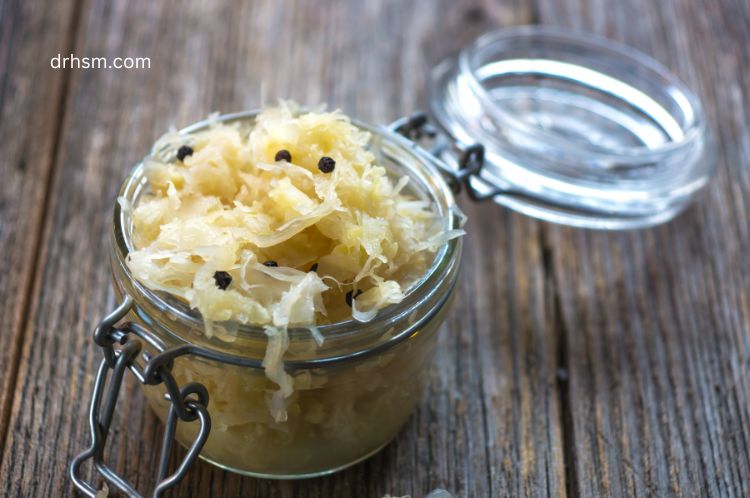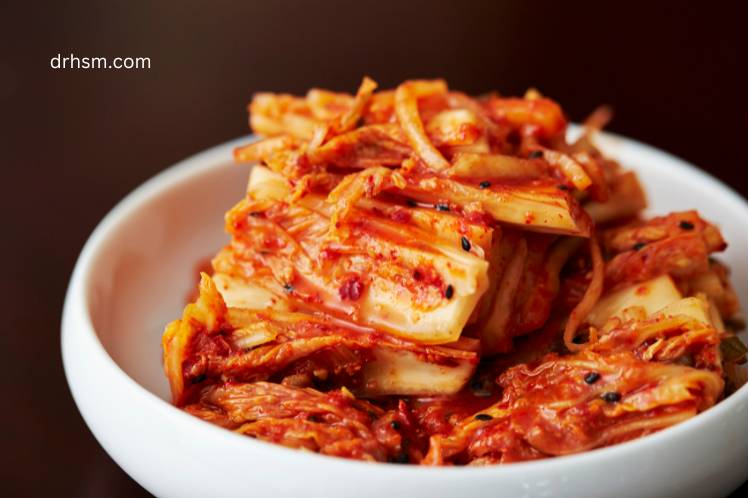Welcome to today's blog post on vitamin k2 in food.
Are you concerned about your teeth and looking for natural ways to improve your oral health? Incorporating vitamin K2 into your diet can be a game-changer.
Incorporating foods rich in this essential nutrient into your diet can have numerous health benefits.
In this blog post, we'll explore what exactly Vitamin K2 is, highlight some foods that are high in it, and provide tips on how to easily include more of it in your daily meals.
We'll also discuss potential risks and considerations associated with Vitamin K2 consumption.
So let's dive in and discover the power of Vitamin K2!
What is Vitamin K2?
Vitamin K2, also known as menaquinone, is a crucial nutrient for the body. It plays a vital role in bone health and calcium regulation.
While vitamin K1 is found in leafy green vegetables, vitamin K2 can be obtained from fermented foods like natto and cheese.
Incorporating these foods into your diet can help ensure you're getting enough vitamin K2 to support overall health and wellbeing.
Understanding the Different Forms of Vitamin K
Vitamin K1 and vitamin K2 are two different forms of vitamin K with distinct functions in the body.
While vitamin K1 is primarily found in green leafy vegetables and is involved in blood clotting, vitamin K2 can be sourced from fermented foods like natto and cheese, and plays a crucial role in teeth and bone health and also in cardiovascular function.
Understanding the sources and absorption of vitamin K1, as well as the sources and functions of vitamin K2, can help you make informed dietary choices to ensure optimal intake of this essential nutrient.
The Importance of Vitamin K2
Vitamin K2 plays a crucial role in promoting bone health by improving calcium absorption and preventing mineral loss.
Vitamin K2 Supplement
Click the button below to check price on amazon.
It is particularly beneficial for individuals with osteoporosis or at risk of fractures.
Incorporating vitamin K2-rich foods like natto and cheese into your diet can support optimal bone density and reduce the risk of age-related bone diseases.
Vitamin K2 not only promotes bone health and protects against heart disease, but it also improves dental health, reduces inflammation, enhances cognitive function, and may even have cancer prevention properties.
In addition to its impact on bone health, vitamin K2 also offers significant benefits for heart health.
Studies have shown that this essential nutrient helps prevent arterial calcification, reducing the risk of cardiovascular disease.
Including sources of vitamin K2 in your diet can contribute to maintaining a healthy heart and vascular system.
Moreover, beyond its effects on bones and the cardiovascular system, there are other advantages associated with consuming adequate amounts of vitamin K2.
Promotes Dental Health
Eating foods rich in Vitamin K2 can significantly promote dental health.
This essential nutrient helps prevent tooth decay by supporting the growth of healthy teeth and preventing the breakdown of tooth enamel.
Additionally, it reduces the risk of gum disease by improving overall oral health and strengthening gums.
Incorporating Vitamin K2-rich foods into your diet enhances enamel strength, making your teeth more resilient to damage and maintaining their natural shine for longer periods.
By prioritizing foods rich in vitamin K2 such as natto or cheese, you can reap these versatile benefits for overall well-being.
Foods Rich in Vitamin K2
Fermented Foods
Natto, a traditional Japanese dish made from fermented soybeans, is rich in vitamin K2. This nutrient plays a crucial role in maintaining bone health and preventing cardiovascular disease.
Sauerkraut, a fermented cabbage dish, not only adds tangy flavor to meals but also provides probiotics and vitamin K2.

Lastly, kimchi, the spicy Korean side dish made from fermented vegetables like cabbage and radishes, offers both fiery taste and the benefits of vitamin K2.

By incorporating these fermented foods into your diet regularly, you can increase your intake of this essential nutrient for optimal health.
Animal-Based Foods
Chicken liver, egg yolks, and butter from grass-fed cows are excellent sources of vitamin K2.
These animal-based foods provide essential nutrients along with vitamin K2, which is important for bone health and cardiovascular support.
Incorporating these foods into your diet can help ensure you're getting enough vitamin K2.
- Chicken Liver: An excellent source of both vitamin K2 and other essential nutrients.
- Egg Yolks: Contains a small amount of vitamin K2, along with several vitamins and minerals.
- Butter from Grass-Fed Cows: High-quality butter from grass-fed cows can provide a good amount of vitamin K2.
Including these animal-based foods in your meals will not only enhance the taste but also boost your intake of this vital nutrient.
Leafy Greens and Vegetables
Kale packs a punch when it comes to vitamin K2, with one cup of cooked kale providing a significant amount.
Broccoli, another nutritious cruciferous vegetable, not only boasts high levels of vitamins but also contains some vitamin K2.
Spinach is also worth considering for its impressive array of vitamins and a decent dose of vitamin K2.
Cheese and Dairy Products
Gouda cheese, particularly when aged, is an excellent source of Vitamin K₂. This Dutch cheese ranks high among other varieties in terms of its Vitamin K₂ content.
Feta cheese made from goat's or sheep's milk is another great option for increasing your intake of Vitamin K₂.
Compared to feta sourced from cow's milk, the goat or sheep milk-based version typically offers higher levels of this essential vitamin.
How to Incorporate Vitamin K2 into Your Diet
Incorporate These Foods into Your Diet to Get More Vitamin K2:
1. Natto: Add this traditional Japanese dish made from fermented soybeans to your meals for a significant dose of vitamin K2.
2. Gouda Cheese: Enjoy a slice or two of this popular Dutch cheese as it is one of the richest dietary sources of vitamin K2.
3. Pastured Egg Yolks: Include egg yolks from hens raised on pasture in your diet to get a good amount of vitamin K2.
4. Grass-Fed Butter: Use grass-fed butter in cooking and baking to enhance flavors while increasing your intake of vitamin K2.
5. Chicken Liver: Incorporate chicken liver into your diet occasionally for an excellent source of not only vitamin A but also vitamin K2.
6. Sauerkraut: Include sauerkraut, which is fermented cabbage, as a side dish or topping to add some tanginess and boost your intake of vitamin K2.
7. Ground Beef from Grass-Fed Cows: Opt for ground beef sourced from grass-fed cows as it contains higher levels of beneficial nutrients like omega-3 fatty acids and vitamin K2 compared to conventionally-raised beef.
Remember, incorporating these foods into your regular meals can help you increase the amount of essential nutrient Vitamin K2 in your diet!
Meal Ideas and Recipes
- Include fermented foods like sauerkraut or natto in your meals for a boost of vitamin K2.
- Add grass-fed dairy products such as cheese or butter to your dishes to increase your intake of vitamin K2.
- Try incorporating organ meats like liver into your recipes, which are rich in vitamin K2.
Potential Risks and Considerations
1. Interactions with Medications: It is important to be aware that vitamin K2 can interfere with certain medications, especially those used for blood thinning.
Consult with your healthcare professional before incorporating high levels of vitamin K2 into your diet if you are taking any prescription or over-the-counter medications.
2. Vitamin K2 Deficiency: While incorporating foods rich in vitamin K2 into your diet can be beneficial, it is also crucial to ensure you are not lacking this essential nutrient.
A deficiency in vitamin K2 may lead to an increased risk of cardiovascular diseases and osteoporosis.
Regularly monitor your intake and consider consulting a healthcare professional for personalized guidance on maintaining optimal levels.
Interactions with Medications
Warfarin and other blood thinners can interact with vitamin K2 in the body. These medications work by inhibiting the action of vitamin K, which is necessary for proper blood clotting.
Therefore, it is important to monitor your vitamin K intake while on these medications to ensure that you maintain a consistent level of anticoagulation.
When taking antibiotics, it's essential to consider their impact on vitamin K2 absorption. Certain antibiotics can disrupt the gut bacteria responsible for producing vitamin K2, leading to decreased levels in the body.
To offset this effect, incorporating foods rich in vitamin K2 into your diet can help restore and maintain optimal levels.
Discussing potential interactions with your healthcare provider is crucial when considering medication usage.
Your healthcare provider possesses invaluable knowledge about how different medications may interact with each other or affect nutrient absorption.
Open communication ensures that potential risks are minimized and appropriate measures are taken to optimize your health outcomes.
Vitamin K2 Deficiency
Causes of vitamin K2 deficiency:
- Poor diet lacking in foods rich in vitamin K2
- Malabsorption issues, such as Crohn's disease or celiac disease
Signs and symptoms to watch out for:
- Increased risk of osteoporosis and fractures
- Calcification of blood vessels and heart valves
Importance of maintaining adequate levels:
- Supports bone health and prevents the risk of fractures
- Promotes cardiovascular health by preventing calcification
Consulting with a Healthcare Professional
Consulting with a healthcare professional is crucial when it comes to making decisions about your health.
Their expertise and knowledge can provide you with essential advice that may not be readily available elsewhere.
By seeking professional guidance, you can receive personalized recommendations based on your specific health condition, ensuring that any supplements or treatments are tailored to meet your individual needs.
Additionally, consulting with a healthcare professional can help determine the right dosage for supplementation, ensuring that you receive the appropriate amount of nutrients without any potential risks or adverse effects.
How to Incorporate Vitamin K2 into Your Diet
To incorporate more Vitamin K2 into your diet, try experimenting with new recipes.
Look for dishes that feature ingredients like natto, a fermented soybean product that is particularly high in Vitamin K2. Y
ou can also explore other fermented foods like sauerkraut and kefir, which contain moderate levels of this essential nutrient.
When you're making your grocery list, be sure to include plenty of Vitamin K2-rich foods.
Opt for pasture-raised eggs and dairy products from grass-fed animals as they tend to have higher levels of Vitamin K2 compared to conventionally raised options.
Don't forget about hard cheeses like Gouda and Edam, as they are excellent sources too.
If incorporating enough Vitamin K2 through food alone seems challenging or if you have specific dietary restrictions, consider supplementation as an option.
There are various supplements available on the market that provide a convenient way to ensure you're getting enough of this crucial vitamin.
Remember: variety is key when it comes to nourishing your body with essential nutrients like Vitamin K2!
Try New Recipes
Explore the rich and diverse flavors of traditional Japanese cuisine. From sushi to ramen, there are countless recipes to try that will transport your taste buds to a whole new world.
Experiment with fermented foods like sauerkraut and natto for a unique twist on classic dishes.
These tangy and probiotic-rich ingredients can elevate your meals to the next level of flavor and nutritional value.
Don't forget to incorporate dairy products such as cheese and yogurt into your cooking repertoire.
Not only do they add creaminess and richness, but they also provide a good source of vitamin K2, which is essential for maintaining healthy teeth.
Include Vitamin K2-Rich Foods in Your Grocery List
Include Vitamin K2-Rich Foods in Your Grocery List
To ensure you're getting enough vitamin K2, make sure to include these foods in your grocery list:
- Stock up on grass-fed meat, especially beef and lamb. These meats are not only rich in nutrients but also contain higher levels of vitamin K2 compared to conventionally raised meat.
- Add eggs from free-range chickens to your shopping list. Free-range eggs are not only a healthier choice overall but also provide a good source of vitamin K2.
- Don't forget fatty fish like salmon and mackerel. These delicious options are packed with omega-3 fatty acids as well as vitamin K2.
By incorporating these foods into your diet regularly, you can boost your intake of vitamin K2 and support the health of your teeth.
Consider Supplementation
- Consult with a healthcare professional before starting any supplements.
- Look for high-quality vitamin K2 supplements in the form of MK-7 or MenaQ7®.
- Check if you have any medical conditions that may require higher vitamin K2 intake.
Vitamin K2 Supplement
Click the button below to check price on amazon.
Conclusion
Incorporating vitamin K2-rich foods into your diet is a simple and effective way to boost your intake of this essential nutrient.
From fermented soy products like natto to grass-fed dairy products like cheese and butter, there are plenty of tasty options to choose from.
By including these foods in your daily meals, you can ensure that you're getting an adequate amount of vitamin K2 for optimal health.
While supplementation may be necessary for some individuals, focusing on consuming natural food sources of vitamin K2 should always be the first priority.
Not only do these foods provide other beneficial nutrients, but they also offer a more bioavailable form of vitamin K2 that our bodies can easily absorb and utilize.
So why wait?
Start incorporating these delicious foods into your diet today for improved overall health and wellbeing!

